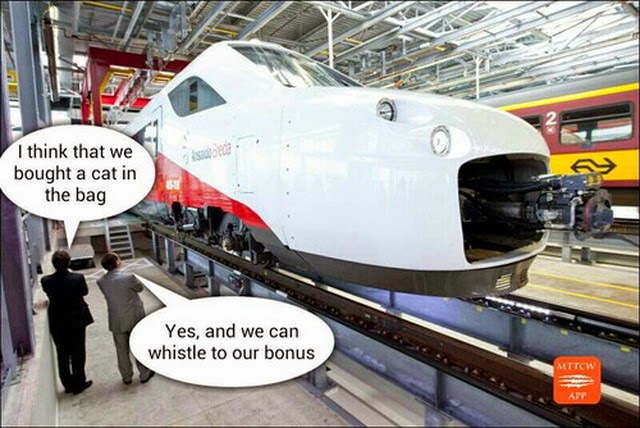Dunglish (a portmanteau of Dutch and
English) or Dutch English is the mistakes native Dutch speakers make when
speaking English.
English instruction in the Netherlands Netherlands Flanders , the Dutch-speaking part of Belgium
The Dutch word for the poorest form of
Dunglish is Steenkolenengels ("Coal English"). This term goes back to
the early twentieth century when Dutch port workers used a rudimentary form of
English to communicate with the personnel of English coal ships.
Errors occur mainly in pronunciation, word
order and the meaning of words. Former Dutch ambassador and prime minister
Dries van Agt supposedly once said "I can stand my little man"
(translation of ik kan mijn mannetje staan, a Dutch idiom meaning roughly
"I can stand up for myself"). The former leader of the Dutch Liberal
Party, Frits Bolkestein, repeatedly referred to economic prospects as
"golden showers", unaware of the term's sexual connotation.
Incorrect meaning
of words
Errors often
occur because of the false friend or false cognate possibility: words are
incorrectly translated for understandable reasons. Examples are:
- Former prime-minister Joop den Uyl once remarked that "the Dutch are a nation of undertakers". The Dutch verb ondernemen is literally the English undertake (as onder is under, and nemen is take). The noun ondernemer is thus literally undertaker; however the idiomatic English usage is instead the French loanword entrepreneur. (Dutch uses the more specific begrafenisondernemer for a funeral director.)
- Former prime-minister Gerbrandy had a meeting with Churchill in London. Gerbrandy entered the room and shook Churchill's hand, saying: "Good-day!" Churchill responded: "This is the shortest meeting I have ever had." Gerbrandy had looked up the English translation of goedendag, which in Dutch can be both used as a greeting and a valediction, "Good-day!" in UK English is most often used as valediction as opposed to good morning or good afternoon.
- During the Second World War, Churchill said to former prime-minister Gerbrandy while the two were standing on a balcony: "Spring is in the air". Gerbrandy's response was: "Why should I?" Gerbrandy thought Churchill told him: "Spring 'ns in de lucht", which translates into English as "jump into the air".
- One of the best quoted examples of Dunglish was said to have taken place between the Dutch foreign minister Joseph Luns (a man whose main foreign language was French, the language of diplomacy prior to World War II) and John F. Kennedy. At one point Kennedy inquired if Luns had any hobbies, to which he replied "I fok horses" (the Dutch verb fokken meaning breeding). Likely taken aback by this strangely obscene reply, Kennedy asked "Pardon?", which Luns then mistook as the Dutch word for "horses" ("paarden") and enthusiastically responded "Yes, paarden!"
- The Dutch word "actueel" means "current" (whereas "actual" in English means "real (and not fake or incorrect)"). A Dutch person unfamiliar with the English word might therefore be confused if he or she were asked about the "actual time" an appointment was supposed to start.
- The Dutch verb solliciteren means to apply for a job, which can lead to an embarrassing situation if someone claims that they have come to solicit.
- The word eventueel in Dutch means potentially (like éventuel in French, eventuell in German, eventual in Spanish, eventuale in Italian, eventual in Portuguese, eventuell in Swedish) and not eventually, which is uiteindelijk in Dutch. This mistake caused a row between the Scottish and Belgian football associations when the Belgian football association invited delegates from various associations over for the "eventual qualification of the Belgian national football team" before the play-offs against Scotland started. While the Scottish federation accused the Belgians of sheer arrogance, the Belgian association had actually meant to hold the drink after a "possible qualification".
- "I am a bit in the war" (from the Dutch Ik ben een beetje in de war, translates as "I am a little bit confused") and "I passed the brook." (Ik paste de broek, translates as "I tried on the trousers") are classic examples of too literal Dunglish translations. Another example is the Dunglish Go your gang, from Dutch Ga je gang translates as Go ahead (literally Go your going).
Literature
Dutch author
Maarten H. Rijkens has written two books on the subject for Dutch readers:
"I always get my sin" and "We always get our sin too".















No comments:
Post a Comment